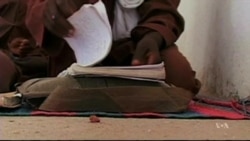Hollywood stars Alicia Keys, Jennifer Garner and 30 others have voiced their support for a U.S.-backed initiative called Let Girls Learn. The $231 million program, funded by the U.S. Agency for International Development, is aimed at ensuring public and quality education for girls worldwide. The new program will focus on five countries in Africa, South Asia, Latin America and the Middle East
“In Nigeria, hundreds of young girls were kidnapped as they prepared for their final exams at a boarding school, in Pakistan, a girl was shot,” says an USAID add.
The U.S. Agency for International Development partners with celebrities to call attention to the importance of education for girls worldwide.
“For them to be motivated by Malala, for them to be motivated by the kidnapping of the girls in Nigeria ... that means we have a whole new group of people that we can educate,” said Christie Vilsack, a USAID senior advisor for international education.
Today, the agency reports that 62 million girls are not in school, and some who insist on getting an education risk their lives.
In Pakistan, teenage activist Malala Yousafzai was shot two years ago for her campaign against Taliban efforts to deny girls an education. On September 12, Pakistani authorities announced the arrest of 10 people believed to be responsible.
Meanwhile in Nigeria, hundreds of school girls are still missing after being kidnapped by the Islamist militant group Boko Haram, whose name means "Western education is a sin" in the local Hausa language.
But Ugandan Mandela Fellow Cyrus Kawalya says education is key to reaching one's full potential. “Education helps you open up your mind. Once you open up your mind, then you choose what information works for you and how you are going to work with it," Kawalya explains. "Without education you cannot open up your mind, then what would you do.”
USAID recently announced it will provide $231 million to fund programs for primary and secondary schools in Afghanistan, Jordan, Guatemala, South Sudan and Nigeria.
“In Nigeria, part of those resources would go for training quality teachers and that is really an important part of it too," Vilsak states. "About 250,000 girls will be affected.”
While a lot progress has been made in getting children to schools in general, a recent report by the World Bank shows that in a number of countries, about 70 percent of students in the second and third grades could not read a simple paragraph. Christie Vilsack, says her agency uses a new system to assess students. “I was in Pakistan and got to see the children taking this 10 minute test that very quickly evaluates their fluency, their ability to recognize letters, to name and pronounce the sound of them," she said.
She says the agency is working hard to train teachers to make sure the children are not just memorizing, but truly understanding what they are studying.





